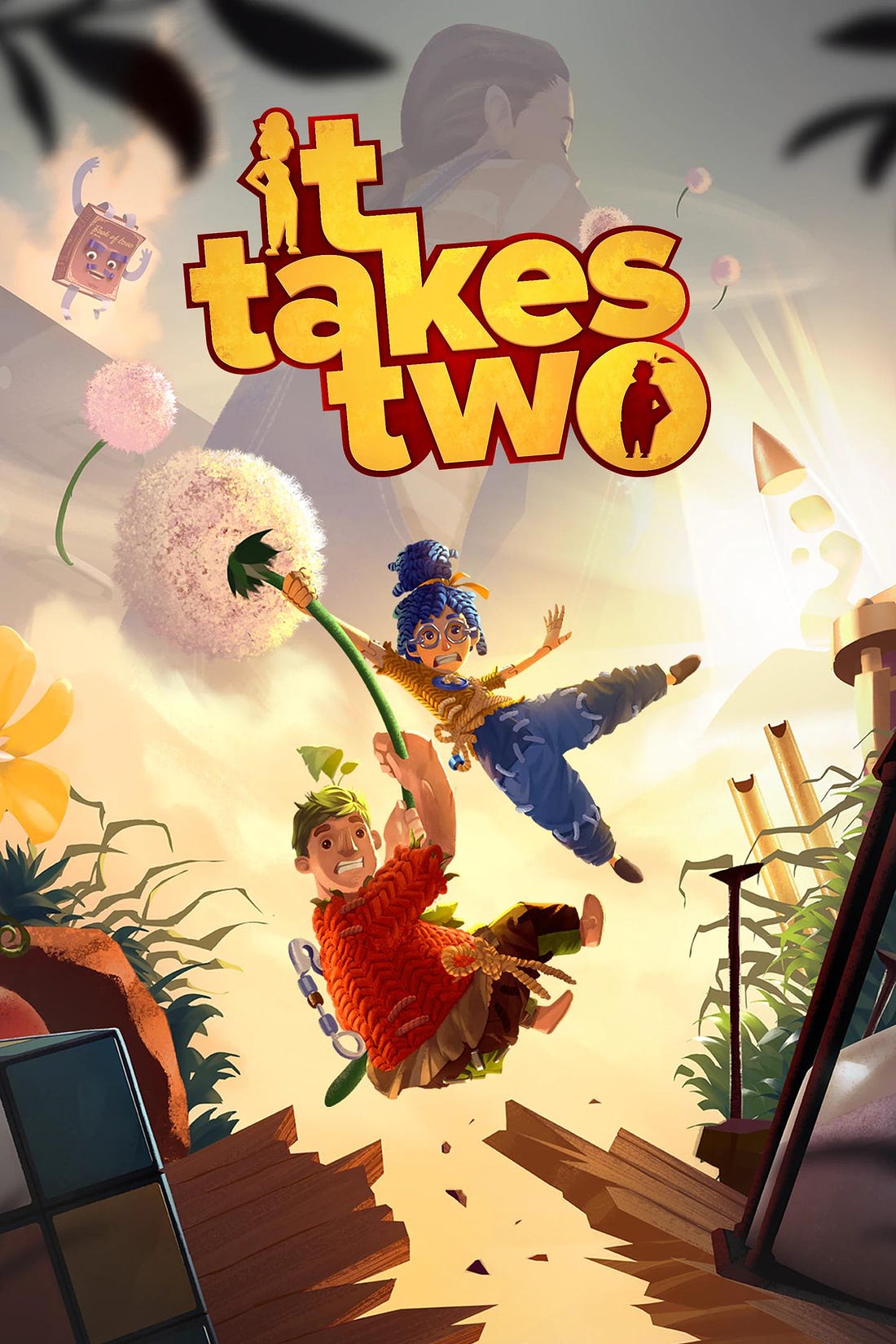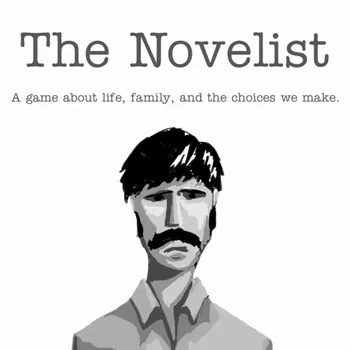There Is No Family In Video Games
Video games are art.
At least, that's what they keep telling me.
Interestingly, for an art form with a lot of storytelling, video games almost never touch on real human issues. In vidya, a real human moment usually sounds like, "See that slime monster in the corner? Stab it with a sword. Also, I AM ANGRY!"
Art, since the Ancient Greeks/Forever, has always heavily dealt with the workings of the basic building block of human civilization, the family. The difficult business of husbands and wives, parents and children.
I've been trying to think of other games about the functioning of a family, and I'm not coming up with a lot.
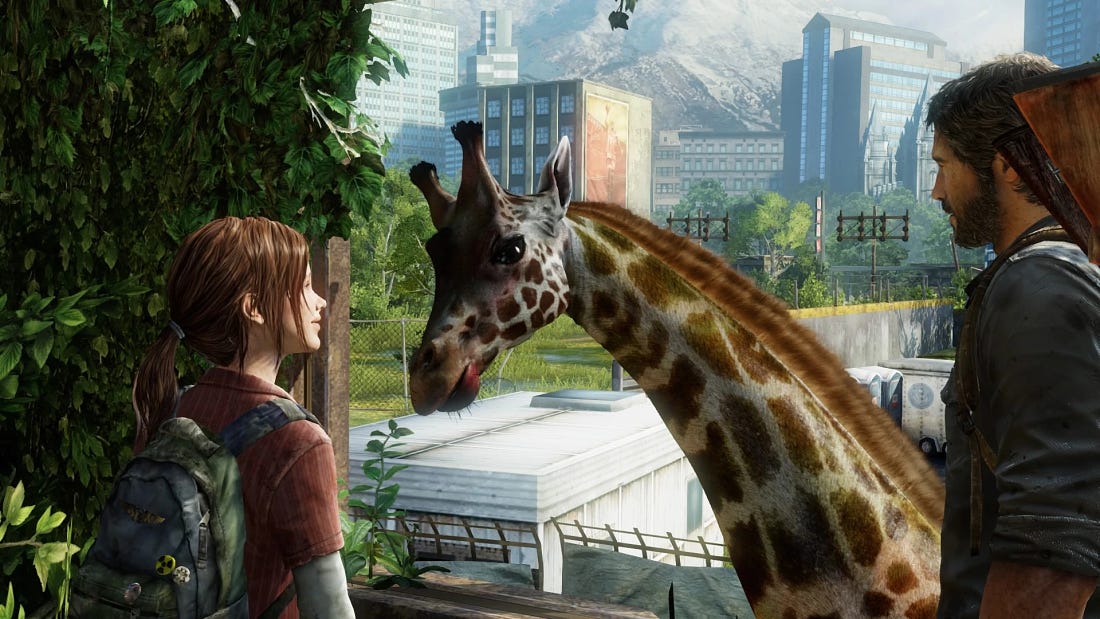
The Last of Us found love and joy in the darkest of settings. In The Last of Us 2, Ellie strangles this giraffe to death in order to feel an emotion.
A Few Examples
The touching relationship between Ellie and her father-substitute Joel in The Last of Us was very good. Then, in the next game, it devolved into a nihilistic bloodbath, about a quarter as profound as it thought it was. (Apparently, violent, unending revenge is bad.) What a sad waste, in a game that sure got forgotten quickly.)
Brothers: A Tale of Two Sons has, well, sons, and a father, and a dead mom. The sons go on an adventure. But it's just pretty standard puzzle-solving and troll-dodging. None of the people in it ever become fully 3 dimensional.
There was a depressing and largely forgotten 2013 indie game called The Novelist, about a depressing husband, wife, and child. You made decisions for them to try to save them from utter despair.
However, every decision you made for this family was zero-sum: You could never make anyone happy without making someone else miserable. In any family, one person had to be utterly crushed so the others could survive. Life doesn't work that way.
Then there was Dragon Age 2. Your character, Hawke, has to carry around his or her family. The game is mostly awkward wizard-stabbing and RPG business, but at one point your mom gets turned into a zombie, which is awesome. Not really human business, though.
You can have a family in The Sims. However, those people aren't really people. They're bundles of status bars, improved by the purchase of mountains of consumer goods. And sure, you can have a kid. However, your Sims child will inevitably die from starvation, drown in a swimming pool, or get forever lost in the serial killer maze you build in the basement.
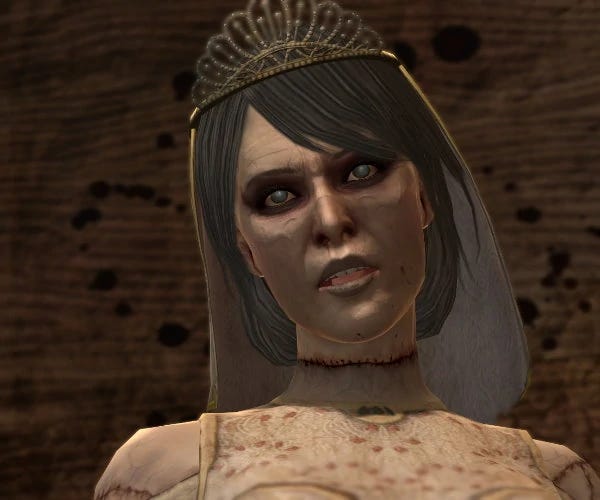
Yikes.
Mother’s Day is going to be soooper awkward this year.
It's Hard to Make Video Game People Into People
In all fairness, trying to tell human stories in video games is REALLY HARD. You can’t put the nuance of human relationships in gameplay, and telling story through cutscenes kind of sucks.
To really be effective as art about people and people-business, the characters need a chance to express themselves as people. This happens through dialogue and self-expression, and through seeing the people confronted with difficult situations and making choices.
Most games don't have room for this. When you want to get to the puzzle-solvy and the zappy-zappy, there's no time for idle chit chat. Gamers will forgive you for having a story as long as you let them ignore it.
But with It Takes Two, it really wants you to know this family. Their past, their habits, their wants, their problems, and how they try to resolve them. That makes it really interesting and unusual.
It Doesn't Help That the World Is Dumb
To create art about actual humans, to try to touch the feelings of actual humans, requires sincerity. Sincerity, in case you have not heard, is cringe.
Also, whatever work you create, whatever expression you take straight out of your heart and share with the world, will immediately be picked to pieces by the world's worst media. There is an endless hoard of instantly replaceable critics who will deliberately misinterpret your work in order to say outrageous things and farm hate clicks.
(Another good recent example of an ambitious developer being ridiculously and excessively hassled is
here.)
You might say creators should just ignore this. That's easy for you to say. Some artists have really thick skins. (I do.) Many don't. You're just going to lose writers to the hate, and some of those writers will be good, and the game industry needs all the good writers it can get.
(There's nothing that can be done about this, alas, not as long as it works. But it's important to note it happens.)
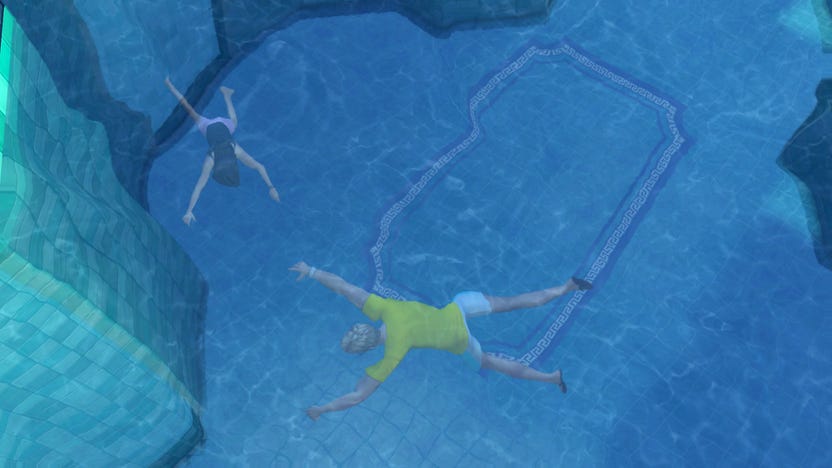 Parenting
Parenting in The Sims. (OK, honestly, this is pretty funny.)
For Example, Look At It Takes Two
It's a game about a couple with a small child. They're on the edge of divorce but their child does not want this and makes the parents try to reconcile.
It you went to, like, actual humans with this idea, it would be pretty non-controversial. Divorce can't always be avoided, but it's good to try to reconcile especially if kids are involved. You really have to make sure your troubles can't be overcome. If they can be, and you still get divorced, you are unnecessarily hurting your children and blowing up a perfectly good life.
Yet I was able to find no shortage of click-farmers who were
angered by the very premise of the game. Showing a couple trying to stay together was deemed offensive.
Here is
one typical quote: "Hopefully, It Takes Two takes that next step into taking a realistic approach to depicting divorce." (In an article that began with how devastated the writer was by his own parents' divorce.) Wow! I look forward to his next piece, "The Grinch Was Right! Screw the Whos!"
I mean, this is weird, right? There's kind of a raw nerve sensitivity and reflexive anger and defensiveness to these pieces I find kind of unnerving. Sometimes, damaged relationships are saved. Happens all the time! I hope that these articles are just cynical grabs for click-pennies, because, if they are genuine expressions of opinion, serious bummer.
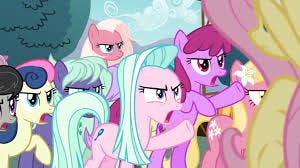
These are the people who are criticizing you.
If You Want To Make Art Today, Filter Your Inputs
Note that all the worst feedback are negative. What all these critics are doing is acting as art-cops. “You shouldn’t do this!” “You can’t do this!” It’s hard to create and so, so easy to forbid and tear down. That’s why they do it.
This is why I recommend that artists avoid reading criticism as much as possible, especially today.
When you open your head to all the madness of the world, you won't get much of value. You'll get a million different voices, and most of them want to psych you out and scare you out of making work.
This applies when you're just writing a goofy game where you stab demons with robots. It goes double when you're trying to make something honest and heartfelt.
If you write about divorce, you're going to be poking a million raw nerves everywhere. So write what you want. Write what feels true to you. But do so, as much as possible, in silence.
"But You're Going To Criticize the Game! Doesn't That Make You a Hypocrite? Huh? HUH!?"
People should discuss and criticize works of art. Of course they should. I'm about to do it. Everyone will shout about your work. Most of those opinions will be dumb (as we have seen above). I think artists should try to hide from this flood of madness and only get feedback from a small, curated number of trusted voices.
So I'm not a hypocrite for talking. I just don't think the makers of the game should read what I say. I hope they don't! They've released the game. They're done. They're out of the picture. What they think now doesn't matter. Now it’s just between us and their work. They should forget us and go make their next thing.
So That's My Advice For Today
If you want to make art, make it. Tell your story, the unique product of your unique brain, and share it with the world. Ignore anger merchants. Ignore complainers. Ignore (God help us all) sensitivity readers.
OK, that was me clearing my throat. In a couple days, I’ll put out a bunch of opinions on It Takes Two, which you should play now.
The actual review comes in a couple days. In the meantime, we wrote a game called
Queen’s Wish that has a lot of family stuff in it. It’s pretty good. Also, free blog subscriptions!



























